高中英语人教版(2019)选择性必修第三册Unit 3 Environmental Protection Listening and Talking 课件(27张ppt)
文档属性
| 名称 | 高中英语人教版(2019)选择性必修第三册Unit 3 Environmental Protection Listening and Talking 课件(27张ppt) |

|
|
| 格式 | zip | ||
| 文件大小 | 5.1MB | ||
| 资源类型 | 教案 | ||
| 版本资源 | 人教版(2019) | ||
| 科目 | 英语 | ||
| 更新时间 | 2021-11-12 08:53:31 | ||
图片预览

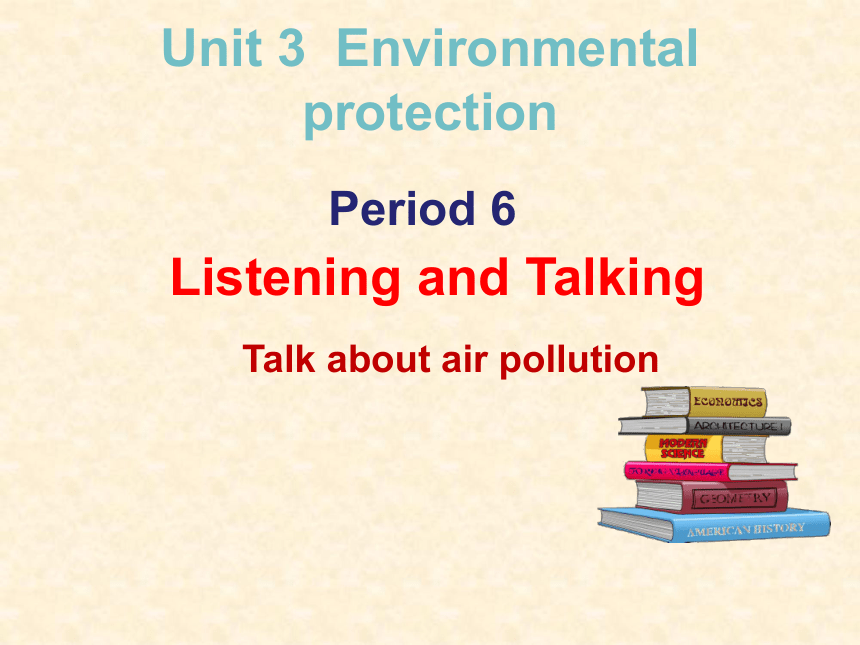
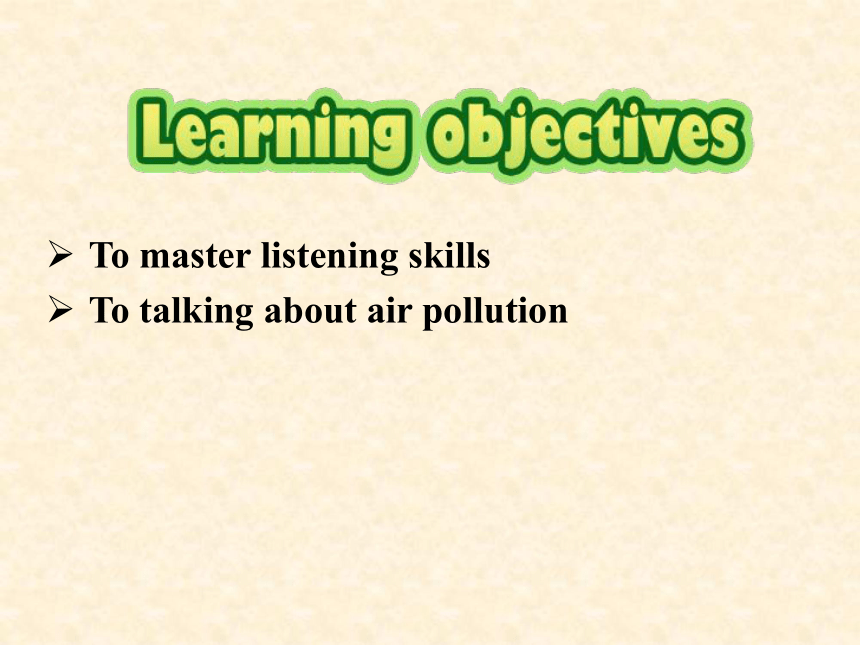
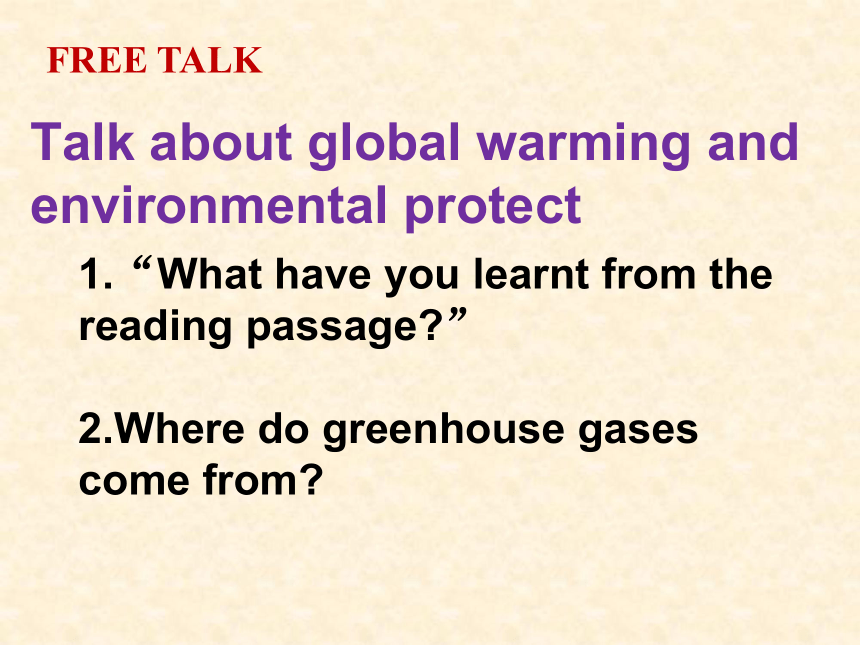
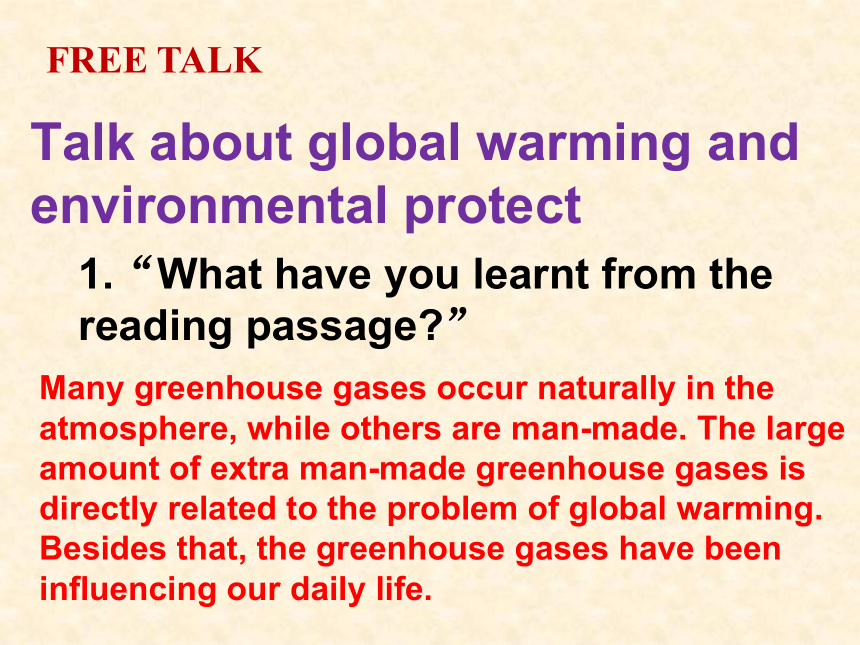
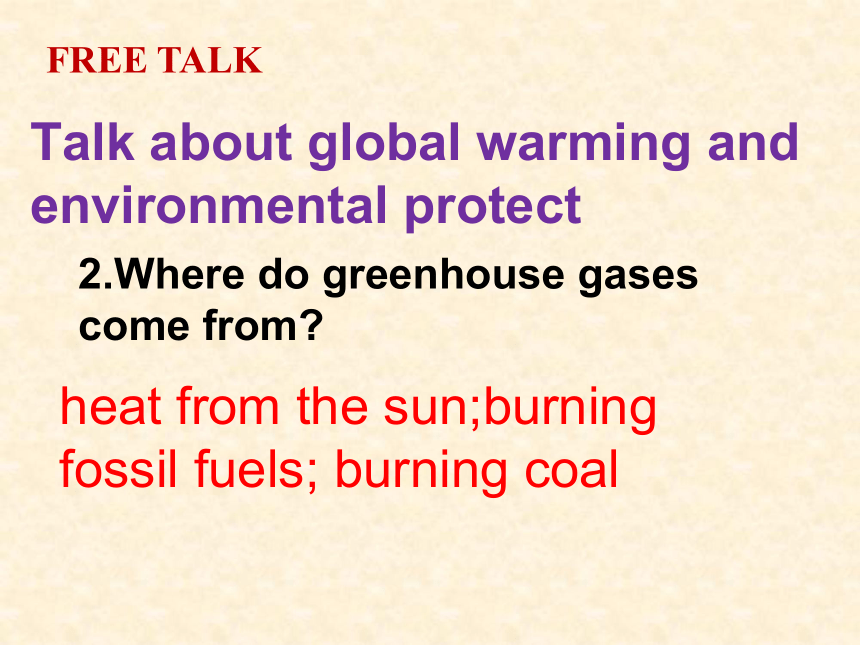
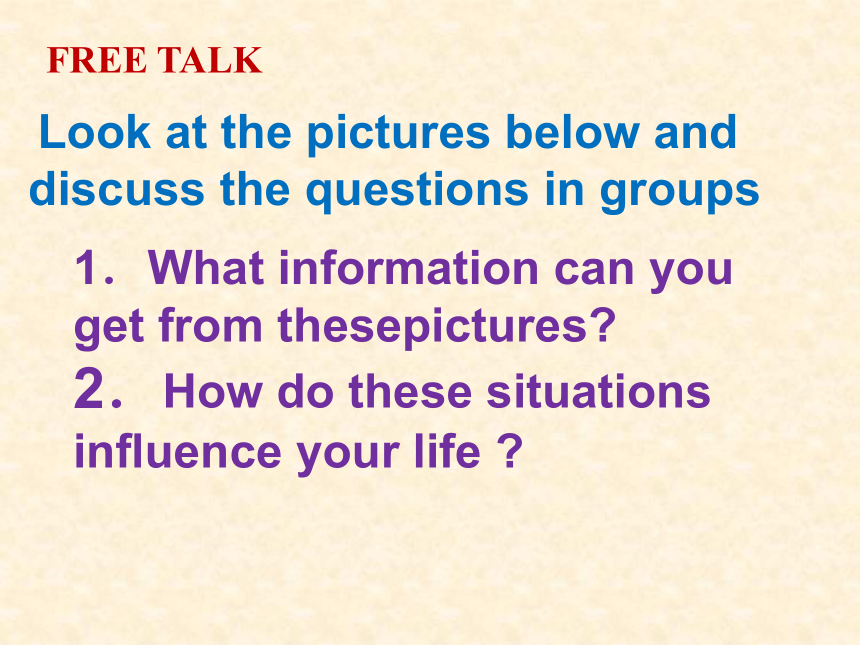
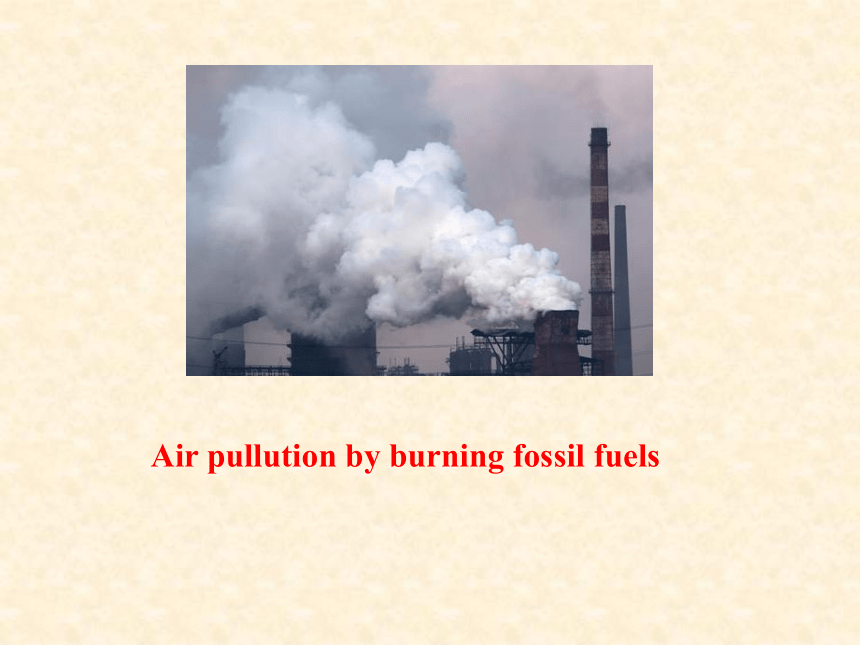
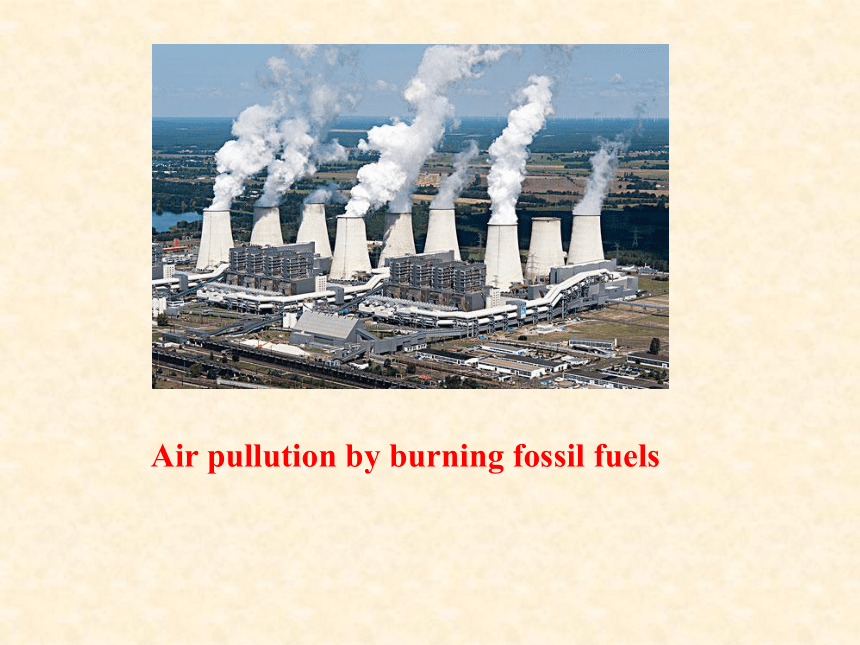
文档简介
(共27张PPT)
选择性必修
第三册
Unit 3 Environmental protection
Listening and Talking
Period 6
Talk about air pollution
To master listening skills
To talking about air pollution
FREE TALK
Talk about global warming and environmental protect
1.“What have you learnt from the reading passage ”
2.Where do greenhouse gases come from
FREE TALK
Talk about global warming and environmental protect
1.“What have you learnt from the reading passage ”
Many greenhouse gases occur naturally in the atmosphere, while others are man-made. The large amount of extra man-made greenhouse gases is directly related to the problem of global warming. Besides that, the greenhouse gases have been influencing our daily life.
FREE TALK
Talk about global warming and environmental protect
2.Where do greenhouse gases come from
heat from the sun;burning fossil fuels; burning coal
FREE TALK
1.What information can you get from thesepictures
2.How do these situations influence your life
Look at the pictures below and discuss the questions in groups
Air pullution by burning fossil fuels
Air pullution by burning fossil fuels
Air pullution by burning coal
Air pullution by burning coal
smog
smog
New energy
LISTENING TASK1
Listen to an interview with an air pollution expert and decide whether the statement are true (T) or false (F).
1. The expression"smog" originated in Britain and means a combination of smoke"and fog".
2. smog became a severe problem in Britain because people at that time burnt lots of fossil fuels.
3.The worst smog in British history happened in London in 1942.
4.The Great Smog of London claimed 5,000 lives.
5. Later the UK government ordered people not to burn wood in their homes.
T
F
√
T
F
√
F
T
√
F
T
√
F
T
√
LISTENING TASK2
Listen again and take notes on what the expert said. Then summaries the information you got from the interview.
Ben Drake.an expert on air pollution, is being interviewed on the radio.He said that smog was a severe problem 1 century in Britain.At that time.Britain was experiencing a boom in 2 .factories and homes 3 , which created smog. He also mentioned the heavy smog in London 4 in 1952. Later the UK government restricted 5 in homes and forced factories to 6 .As smog is harmful to everyone,the expert advised us 7
,
use 8 and further develop 9 .
LISTENING TASK2
Listen again and take notes on what the expert said. Then summaries the information you got from the interview.
Ben Drake.an expert on air pollution, is being interviewed on the radio.He said that smog was a severe problem century in Britain.At that time.Britain was experiencing a boom in .factories and homes , which created smog. He also mentioned the heavy smog in London in 1952. Later the UK government restricted in homes and forced factories to .As smog is harmful to everyone,the expert advised us
,
use and further develop .
in the early 20th
industry
used lots of coal
was particularly bad and caused over 4,000 deaths
burning coal
move away from city centers
replace coal with cleaner forms of energy
new energy-efficient vehicles
green technology
SUMMATISE INFORMATION
In active listening, summarizing help you review the key points of a speaker’s message. In order to write a good summary , you must take motes of the most important points as you listen. When summarizing, you need to be as concise as possible and use your own words.
LISTENING TASK3
SUMMATISE INFORMATION
Talking task
Work in groups. Discuss the questions. The expressions in the box may help you. Then present your news report to a partner.
1. Have you experienced heavy smog where you live Have you seen photos of big cities
under clouds of smog What is it like
2. What do you think are the major causes of smog in China
3. What measures have the government and citizens taken to help address the problem
Talking task
Work in groups. Discuss the questions. The expressions in the box may help you. Then present your news report to a partner.
1. Have you experienced heavy smog where you live Have you seen photos of big cities
under clouds of smog What is it like
1.I have occasionally experienced heavy smog where I live. I have also seen pictures of heavy smog over cities. It is very thick and hard to see through. There is no doubt that it is not a good thing.
Talking task
Work in groups. Discuss the questions. The expressions in the box may help you. Then present your news report to a partner.
2. What do you think are the major causes of smog in China
2.Industry and vehicles are the major causes of smog in China
Talking task
Work in groups. Discuss the questions. The expressions in the box may help you. Then present your news report to a partner.
3. What measures have the government and citizens taken to help address the problem
3.Most people think that pollution at a certain level is a necessary result of growth, but the government is taking measures to keep it in check by developing green energy solutions and controlling factory and vehicle emissions.
1.Try to finish the listening exercise.
2.Preview using language on page 32-33.
Try to finish the listening exercise.
第一节
听下面5段对话。每段对话后有一个小题,从题中所给的A、B、C三个选项中 选出最佳选项。听完每段对话后,你都有10秒钟的时间来回答有关小题和阅读下一 小题。每段对话仅读一遍。
1.Where does Sheila come from
A. Japan. B. The U.S. C. China.
2.What is the weather like now
A. Windy. B. Rainy. C. Snowy.
3.What time is it now
C.A. About 8:00. B. About 9:00. C.About 10:00.
4.What does the woman mean
A.The man is lying.
B.The man is quite old.
C. The man is not hard-working.
5.Why did Lily leave
A.To go for another game. B. To pick up her mother.
第二节
听下面5段对话或独白。每段对话或独白后有几个小题,从题中所给的A、B、C 三个选项中选出最佳选项。听每段对话或独白前,你将有时间阅读各个小题,每小题 5秒钟;听完后,各小题将给出5秒钟的作答时间。每段对话或独白读两遍。
Try to finish the listening exercise.
听第6段材料,回答第6、7题。
6.What did the man do just now
A.He worked out.
B.He prepared for a test.
C.He did some chemistry exercises.
7.Where will the woman go next
A.To the park. B. To the gym. C. To the library.
听第7段材料,回答第8、9题。
8.Why doesn't the man want to go diving
A.He thinks it tiring. B. He isn't interested now. C. He has a pain in his leg.
9.What do the speakers decide to do at last
A.Watch videos at home. B. Do rock climbing. C. Go skateboarding.
听第8段材料,回答第10至12题。
10.Why won't the man work in the woman's garden tomorrow
A.He'll watch a show.
B.The weather will be wet.
C.Some materials have not arrived.
11.What will the woman do on Thursday afternoon
A.Go out of town. B. Wait for the man. C. Meet a garden worker.
12.When will the man go to pick up the key
A. This afternoon. B. Tomorrow morning. C. Tomorrow afternoon.
Try to finish the listening exercise.
听第9段材料,回答第13至16题。
13.What is the probable relationship between the speakers
A. Classmates B. Brother and sister C.. Husband and wife
14.What kind of apartment does the woman want
A. One near public transportation.
B.One equipped with furniture.
C.One in the center of the city.
15.How will the speakers get the apartment information
A. From a friend . B. From the Internet.C. From the newspaper.
16.What do we know about the speakers
A. They like doing exercise.
B.They can't afford to buy a house.
C.They want to live in a big apartment.
Try to finish the listening exercise.
听第10段材料,回答第17至20题。
17.What is the speaker mainly discussing
A. Her brothers. B. Her classmates. C. Her life in Spain.
18.What did the speaker do in Spain
C.A. She learned Spanish. B. She taught English. C.She visited her friends.
19.What can we learn about the school
A.It opened from Monday to Saturday.
B.It was not far from downtown Madrid.
C.It had students from different countries.
20.Who did the speaker probably spend the most time with
A. Jim. B. Javi. C. Jerry.
高二英语听力试题2
l.B 2.B 3.C 4. A 5.C 6. A 7. C 8. B 9. A 10. B 11. A 12. B 13. C 14. A 15. C 16. A 17. C 18. A 19. C 20. B
选择性必修
第三册
Unit 3 Environmental protection
Listening and Talking
Period 6
Talk about air pollution
To master listening skills
To talking about air pollution
FREE TALK
Talk about global warming and environmental protect
1.“What have you learnt from the reading passage ”
2.Where do greenhouse gases come from
FREE TALK
Talk about global warming and environmental protect
1.“What have you learnt from the reading passage ”
Many greenhouse gases occur naturally in the atmosphere, while others are man-made. The large amount of extra man-made greenhouse gases is directly related to the problem of global warming. Besides that, the greenhouse gases have been influencing our daily life.
FREE TALK
Talk about global warming and environmental protect
2.Where do greenhouse gases come from
heat from the sun;burning fossil fuels; burning coal
FREE TALK
1.What information can you get from thesepictures
2.How do these situations influence your life
Look at the pictures below and discuss the questions in groups
Air pullution by burning fossil fuels
Air pullution by burning fossil fuels
Air pullution by burning coal
Air pullution by burning coal
smog
smog
New energy
LISTENING TASK1
Listen to an interview with an air pollution expert and decide whether the statement are true (T) or false (F).
1. The expression"smog" originated in Britain and means a combination of smoke"and fog".
2. smog became a severe problem in Britain because people at that time burnt lots of fossil fuels.
3.The worst smog in British history happened in London in 1942.
4.The Great Smog of London claimed 5,000 lives.
5. Later the UK government ordered people not to burn wood in their homes.
T
F
√
T
F
√
F
T
√
F
T
√
F
T
√
LISTENING TASK2
Listen again and take notes on what the expert said. Then summaries the information you got from the interview.
Ben Drake.an expert on air pollution, is being interviewed on the radio.He said that smog was a severe problem 1 century in Britain.At that time.Britain was experiencing a boom in 2 .factories and homes 3 , which created smog. He also mentioned the heavy smog in London 4 in 1952. Later the UK government restricted 5 in homes and forced factories to 6 .As smog is harmful to everyone,the expert advised us 7
,
use 8 and further develop 9 .
LISTENING TASK2
Listen again and take notes on what the expert said. Then summaries the information you got from the interview.
Ben Drake.an expert on air pollution, is being interviewed on the radio.He said that smog was a severe problem century in Britain.At that time.Britain was experiencing a boom in .factories and homes , which created smog. He also mentioned the heavy smog in London in 1952. Later the UK government restricted in homes and forced factories to .As smog is harmful to everyone,the expert advised us
,
use and further develop .
in the early 20th
industry
used lots of coal
was particularly bad and caused over 4,000 deaths
burning coal
move away from city centers
replace coal with cleaner forms of energy
new energy-efficient vehicles
green technology
SUMMATISE INFORMATION
In active listening, summarizing help you review the key points of a speaker’s message. In order to write a good summary , you must take motes of the most important points as you listen. When summarizing, you need to be as concise as possible and use your own words.
LISTENING TASK3
SUMMATISE INFORMATION
Talking task
Work in groups. Discuss the questions. The expressions in the box may help you. Then present your news report to a partner.
1. Have you experienced heavy smog where you live Have you seen photos of big cities
under clouds of smog What is it like
2. What do you think are the major causes of smog in China
3. What measures have the government and citizens taken to help address the problem
Talking task
Work in groups. Discuss the questions. The expressions in the box may help you. Then present your news report to a partner.
1. Have you experienced heavy smog where you live Have you seen photos of big cities
under clouds of smog What is it like
1.I have occasionally experienced heavy smog where I live. I have also seen pictures of heavy smog over cities. It is very thick and hard to see through. There is no doubt that it is not a good thing.
Talking task
Work in groups. Discuss the questions. The expressions in the box may help you. Then present your news report to a partner.
2. What do you think are the major causes of smog in China
2.Industry and vehicles are the major causes of smog in China
Talking task
Work in groups. Discuss the questions. The expressions in the box may help you. Then present your news report to a partner.
3. What measures have the government and citizens taken to help address the problem
3.Most people think that pollution at a certain level is a necessary result of growth, but the government is taking measures to keep it in check by developing green energy solutions and controlling factory and vehicle emissions.
1.Try to finish the listening exercise.
2.Preview using language on page 32-33.
Try to finish the listening exercise.
第一节
听下面5段对话。每段对话后有一个小题,从题中所给的A、B、C三个选项中 选出最佳选项。听完每段对话后,你都有10秒钟的时间来回答有关小题和阅读下一 小题。每段对话仅读一遍。
1.Where does Sheila come from
A. Japan. B. The U.S. C. China.
2.What is the weather like now
A. Windy. B. Rainy. C. Snowy.
3.What time is it now
C.A. About 8:00. B. About 9:00. C.About 10:00.
4.What does the woman mean
A.The man is lying.
B.The man is quite old.
C. The man is not hard-working.
5.Why did Lily leave
A.To go for another game. B. To pick up her mother.
第二节
听下面5段对话或独白。每段对话或独白后有几个小题,从题中所给的A、B、C 三个选项中选出最佳选项。听每段对话或独白前,你将有时间阅读各个小题,每小题 5秒钟;听完后,各小题将给出5秒钟的作答时间。每段对话或独白读两遍。
Try to finish the listening exercise.
听第6段材料,回答第6、7题。
6.What did the man do just now
A.He worked out.
B.He prepared for a test.
C.He did some chemistry exercises.
7.Where will the woman go next
A.To the park. B. To the gym. C. To the library.
听第7段材料,回答第8、9题。
8.Why doesn't the man want to go diving
A.He thinks it tiring. B. He isn't interested now. C. He has a pain in his leg.
9.What do the speakers decide to do at last
A.Watch videos at home. B. Do rock climbing. C. Go skateboarding.
听第8段材料,回答第10至12题。
10.Why won't the man work in the woman's garden tomorrow
A.He'll watch a show.
B.The weather will be wet.
C.Some materials have not arrived.
11.What will the woman do on Thursday afternoon
A.Go out of town. B. Wait for the man. C. Meet a garden worker.
12.When will the man go to pick up the key
A. This afternoon. B. Tomorrow morning. C. Tomorrow afternoon.
Try to finish the listening exercise.
听第9段材料,回答第13至16题。
13.What is the probable relationship between the speakers
A. Classmates B. Brother and sister C.. Husband and wife
14.What kind of apartment does the woman want
A. One near public transportation.
B.One equipped with furniture.
C.One in the center of the city.
15.How will the speakers get the apartment information
A. From a friend . B. From the Internet.C. From the newspaper.
16.What do we know about the speakers
A. They like doing exercise.
B.They can't afford to buy a house.
C.They want to live in a big apartment.
Try to finish the listening exercise.
听第10段材料,回答第17至20题。
17.What is the speaker mainly discussing
A. Her brothers. B. Her classmates. C. Her life in Spain.
18.What did the speaker do in Spain
C.A. She learned Spanish. B. She taught English. C.She visited her friends.
19.What can we learn about the school
A.It opened from Monday to Saturday.
B.It was not far from downtown Madrid.
C.It had students from different countries.
20.Who did the speaker probably spend the most time with
A. Jim. B. Javi. C. Jerry.
高二英语听力试题2
l.B 2.B 3.C 4. A 5.C 6. A 7. C 8. B 9. A 10. B 11. A 12. B 13. C 14. A 15. C 16. A 17. C 18. A 19. C 20. B
